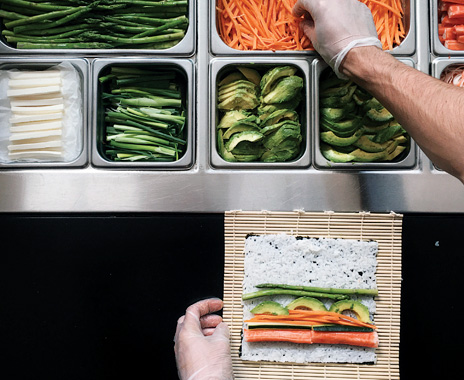Stephan Harman and brothers Zach and Josh Weprin grew up together on the same street in Dayton, Ohio. Decades later, the three have remained close, both as friends and as cofounders of “an inspired sushi experience.”
“We inspire our guests to create their perfect sushi roll using an ingredient-based road map that we provide for them,” Harman says.
The design-your-own sushi roll starts with seasoned rice. Guests then choose a wrap, protein, veggies, and toppings. Traditionalists can create a spicy tuna roll with a seaweed wrap, uncooked tuna, avocado, cucumber, green onion, and spicy sauce, or a California roll with a seaweed wrap, crab, cucumber, and avocado.
Those who may be leery of seaweed or raw fish can choose a soy wrap and fill it with cooked steak, chicken, shrimp, or crab. Vegetarians can create a roll with all vegetables or choose tofu as a protein, and all guests can go as spicy or mild as they want with toppings ranging from wasabi mayo to sweet soy. There are thousands of possible combinations, but all rolls are cut into 10 pieces and priced around $10.
“We have yet to find a dietary concern we haven’t been able to accommodate,” Harman says.
Sides on the Fusian menu include cucumber salad, seaweed salad, steamed edamame, and spicy edamame. Beverage offerings are house-made and free of high-fructose corn syrup. Rotating seasonal choices include Agave Lemonade, Agave Ginger-ade, and a variety of organic teas.
Josh Weprin is head of operations and culture for Fusian, while Zach Weprin is the CEO, handling finance and strategy, and Harman leads marketing and development. The three brought experience in finance, real estate, and hospitality to the business but lacked culinary know-how.
“None of us had ever worked in a restaurant kitchen before, which was a blessing because we came into the industry with a clean slate,” Harman says. “We collectively are obsessively curious, and we worked with chefs to create a laboratory where we could play around with recipes until they were right.”
Harman says the team unanimously decided that the best sushi was the simplest sushi.
Fusian
FOUNDERS: Zach Weprin, Josh Weprin,
& Stephan Harman
HQ: Columbus, Ohio
YEAR STARTED: 2010
ANNUAL SALES: Undisclosed
TOTAL UNITS: 10
FRANCHISE UNITS: 0
“We invested early on in operations protocol, including a self-paced training program called Fusian U,” Harman says. “Our coaches go around to our stores to train people how to do the steps of sushi-making properly.”
Harman says Fusian has also been working with a Japanese company to implement equipment that standardizes some aspects of sushi-making, like a cutting machine and a rice press.
While learning to create simple sushi, the trio saw an unmet opportunity in downtown Cincinnati, Ohio, and opened the first Fusian there.
“There was a very dense daytime market, and we were serving a product for which there were no other options,” Harman says. “Downtown Cincinnati gave us an awesome ecosystem to really hone this and create something. We could make mistakes, try, fail, and tweak based on customer demand and feedback.”
After about a year and a half of tweaking, a second location opened in Dayton, where Harman says they took what they learned about lunchtime and applied it to dinner, as well. The third Fusian location opened near Ohio State University in Columbus. The three also plan to expand into Toledo and Cleveland in the next year and a half.
“We feel this would work everywhere, but we don’t have a specific number of stores we aim to grow to just to hit a goal,” Harman says. “We believe there is still a lot of opportunity in the markets we’re in right here in the heartland.”
He adds that he and the Weprins have no intention of franchising Fusian because they want to preserve a strong team culture. The brand’s core values include sustainability and community, and it is committed to sourcing proteins that are sustainably caught and ethically raised, and purchasing local produce whenever possible.
“We believe we have a responsibility to be stewards of the environment,” Harman says. Beyond using sustainable materials in the build-outs, the stores also use LED lighting. All food packaging, drinkware, and flatware are made of corn or paper and are composted at a local composting facility along with food scraps, which Harman says is a great way to put food waste back into the soil.
Fusian is also committed to the communities it enters. “We want customers to come in and see a reflection of who they are as a community,” Harman says. “We try to put things into every restaurant that reflect civic pride.”







